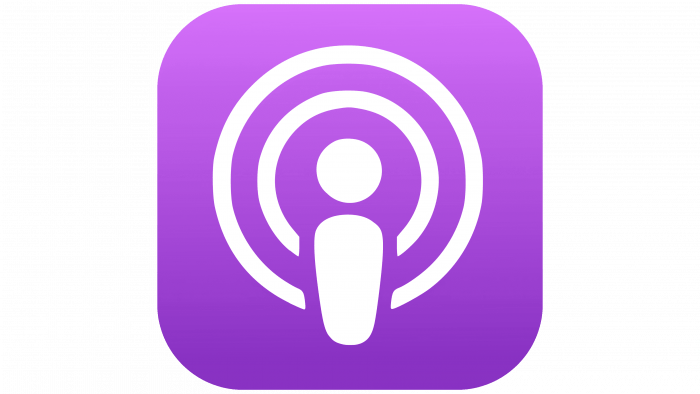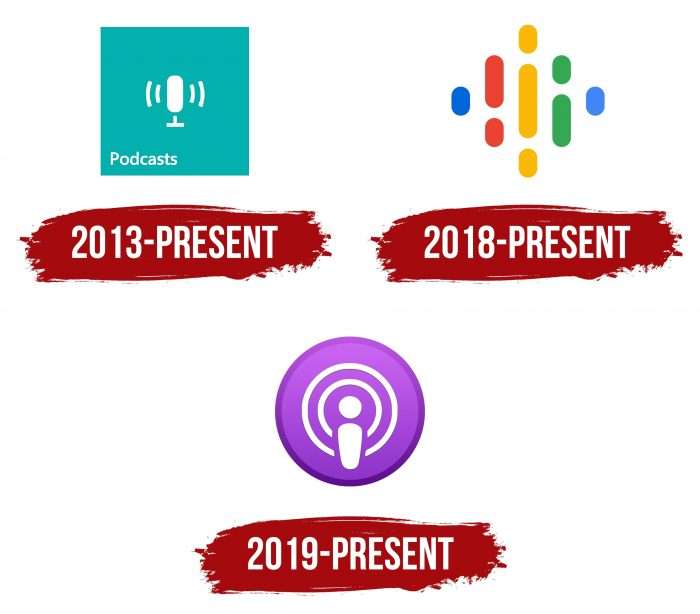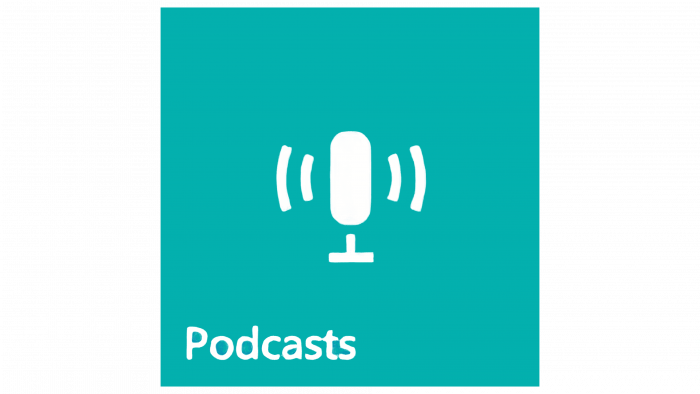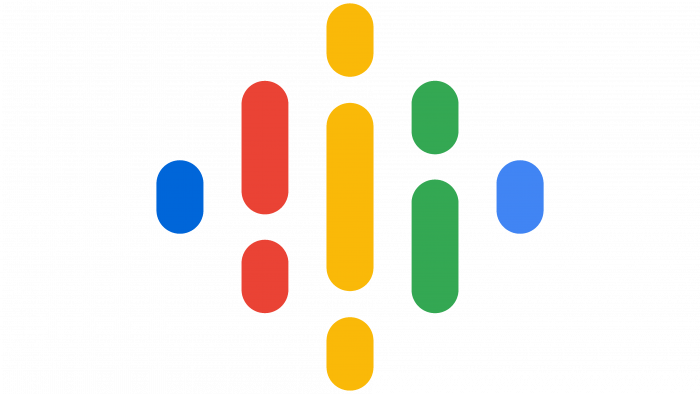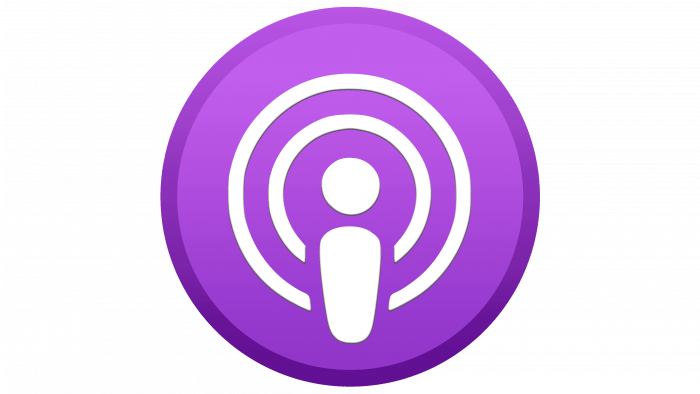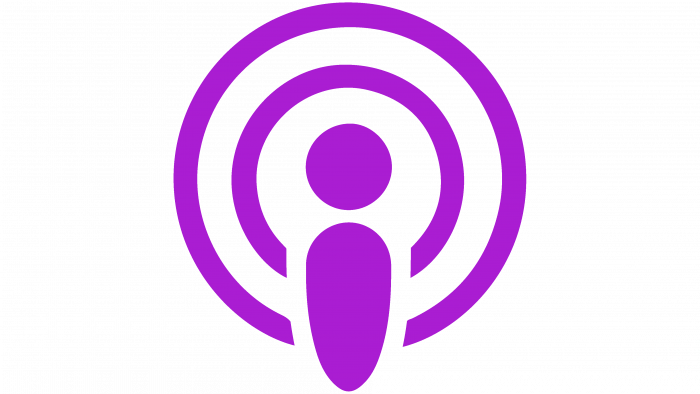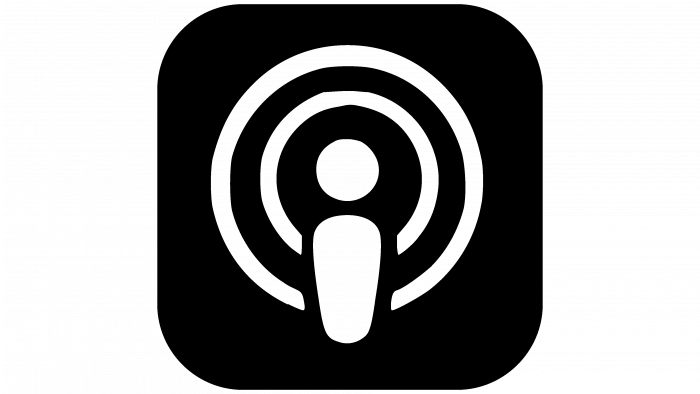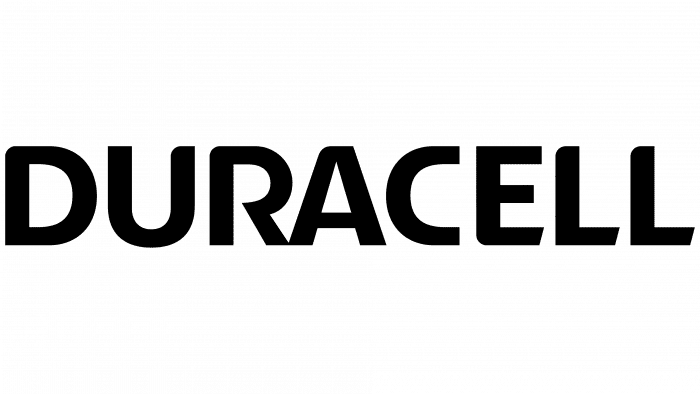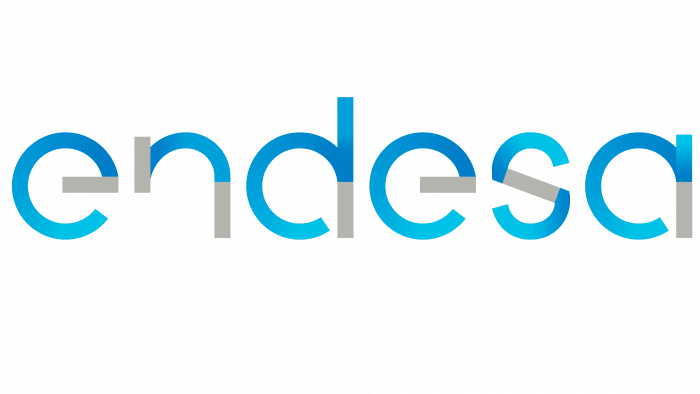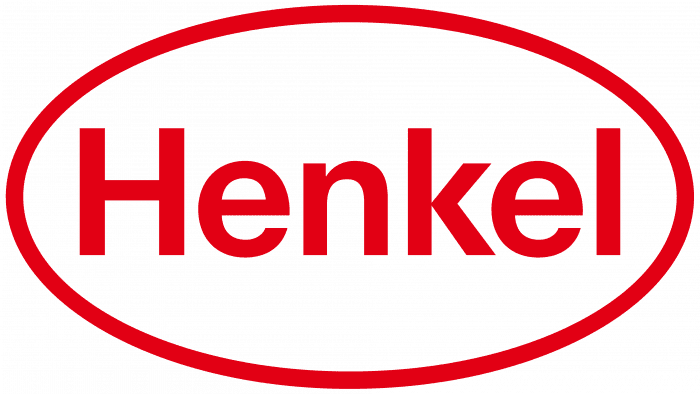The Podcast logo guarantees communication and transmission of information. The emblem indicates disseminating useful, educational messages that the lecturer writes down for users. To listen to them, click on the Start button.
Podcast: Brand overview
| Founded: | 2013 |
| Founder: | Dave Winer |
| Headquarters: | United States |
Meaning and History
In the fall of 2000, Tristan Louis proposed to attach video and audio files to RSS feeds. The idea was implemented by Dave Winer, author of RSS and specialized software programmer. The result of his work was the widespread use of podcasting because this method is in demand for using content not only for personal but also for corporate purposes.
The debut application that turned theory into practice was iPodderX. It came about thanks to the efforts of August Trometer and Ray Slakinski, who developed it. This transition gave a sharp impetus to the development of podcast theory and its widespread use. By 2007, the new format made it possible to do what was previously carried out only within the framework of radio broadcasts. The first chat show was launched by Matt Schichter in 2003 and was called The BackStage Pass.
The hour-long program was recorded live and converted to 16 kbps audio for streaming over a switch connection. As a result, the show was renamed Matt Schichter Interviews and became the first podcast to appear on the Internet.
Also worth noting is another show – Daily Source Code, which was launched in 2004 by Adam Curry. He popularized the new technology, offering news broadcasts and chronicles of the daily lives of celebrities and new podcasts that were emerging at that time.
What is a Podcast?
A podcast is an audio recording that can be downloaded or streamed through the internet. It can be a story with elements of creative work or a program with a host who converses with invited guests. Podcasts can be created by large media companies as well as individual users.
2013 – today (Windows)
In 2013, a personal icon for Windows Phone platforms was launched in several versions – from 8.1 to 10. Although the pattern and background color are set by users individually, there is a general logo scheme. It is an emerald square with a large microphone on a stem. The microphone itself looks like a vertical oval of the correct shape, and its leg resembles a perpendicular symbol and looks like an inverted “T.”
Ethereal waves radiate from the microphone in different directions, which symbolize the broadcasting process. They look like mathematical brackets. There are four of them – two on each side. The word “Podcast” is written in the lower-left corner of the square. It is derived from two pillars: “iPod” and “broadcast.” From one word, the beginning is taken, from the other – the end.
2018 – today(Google)
In 2018, Google also launched its version of a podcast distribution platform. The logo of this service is not similar to the icons of Apple and Microsoft but is made in the corporate style of all the company’s emblems. These are dots and dashes that are lined up in the shape of a rhombus of different colors. In this logo, the developers tried to convey the perception of sound for a person who first saw the Google Podcasts logo.
2019 – today(macOS)
In 2019, a version of the logo was approved for macOS 10.15 version 1.0. This sign looks a little different than the first one. A purple circle with a dark border is used for it. In the center, there is a large white dot, under which an impromptu leg is located. It has the shape of a vertical oval. The bottom side is narrower than the top. All elements are surrounded by open rings, symbolizing the widespread coverage of the territory by broadcasting.
Podcast: Interesting Facts
Podcasts have transformed audio consumption, serving as a stage for varied topics and voices, from entertainment to education.
- Vast Content Library: By early 2023, over 2 million active podcasts and 48 million episodes were accessible, showcasing the medium’s broad appeal and reach.
- Media for All: Podcasts level the playing field for content production, enabling individuals and large companies to share their voices and enriching the audio world beyond traditional media’s scope.
- Audio Drama’s Comeback: The platform has rejuvenated audio drama, with series like “Welcome to Night Vale” drawing listeners back to the rich, sound-based storytelling that television had overshadowed.
- Educational Opportunities: Podcasts offer educational content across various subjects, becoming invaluable for eager learners and enhancing teaching methods with audio lessons.
- Creative Funding Approaches: Podcast creators have explored novel funding means, such as donations, crowdfunding, and advertising, fostering artistic freedom while keeping content accessible.
- Cultural Influence: Some podcasts have deeply influenced culture, inspiring books, TV shows, and films and sparking conversations and legal interest, like the impact of “Serial” on the true crime genre.
- Network Formation: Networks like Gimlet Media provide resources for creators, ensuring quality content production and helping listeners find new favorites.
- Worldwide Access: With internet access, podcasts reach a global audience, offering shows in various languages and discussing region-specific topics, making content universally accessible.
- Technology’s Role: Smartphones and podcasting apps have made discovering and listening to podcasts convenient, boosting popularity.
- Live Interaction: Live podcast recordings offer fans a chance to connect with hosts and guests, strengthening community ties within the podcast world.
- Promotional Avenue: Podcast guest appearances serve as an effective promotional tool for individuals looking to spotlight their work, enriching podcast content with diverse insights.
- Radio’s Transformation: Podcasts have prompted radio to innovate, with many radio shows now available as podcasts and some broadcasters transitioning to the podcast format to embrace its creative possibilities.
These insights demonstrate podcasting’s vibrant, multifaceted nature, showing its capacity to entertain, educate, connect, and inspire. The podcast world promises to remain an essential facet of our digital media environment as it grows.
Font and Colors
For the Windows Phone logo, the designers opted for a sans-serif typeface with close-spaced letters. There is no text in the macOS logo.
Although the palette of the logo is different, they are united by white color: it is present in both variants. Also available in emerald and purple.
Podcast color codes
| Light Sea Green | Hex color: | #03b0ae |
|---|---|---|
| RGB: | 3 176 174 | |
| CMYK: | 98 0 1 31 | |
| Pantone: | PMS 3262 C |
| Azure | Hex color: | #4185f4 |
|---|---|---|
| RGB: | 65 133 244 | |
| CMYK: | 73 45 0 4 | |
| Pantone: | PMS 2727 C |
| Bright Navy Blue | Hex color: | #0066d9 |
|---|---|---|
| RGB: | 0 102 217 | |
| CMYK: | 100 53 0 15 | |
| Pantone: | PMS 2935 C |
| Cinnabar | Hex color: | #ea4335 |
|---|---|---|
| RGB: | 234 67 53 | |
| CMYK: | 0 71 77 8 | |
| Pantone: | PMS Bright Red C |
| Selective Yellow | Hex color: | #fab908 |
|---|---|---|
| RGB: | 250 185 8 | |
| CMYK: | 0 26 97 2 | |
| Pantone: | PMS 7549 C |
| Pigment Green | Hex color: | #34a853 |
|---|---|---|
| RGB: | 52 168 83 | |
| CMYK: | 69 0 51 34 | |
| Pantone: | PMS 7481 C |
| Heliotrope | Hex color: | #d26ef8 |
|---|---|---|
| RGB: | 210 110 248 | |
| CMYK: | 15 56 0 3 | |
| Pantone: | PMS 252 C |
| Dark Orchid | Hex color: | #8932c2 |
|---|---|---|
| RGB: | 137 50 194 | |
| CMYK: | 29 74 0 24 | |
| Pantone: | PMS 2592 C |
